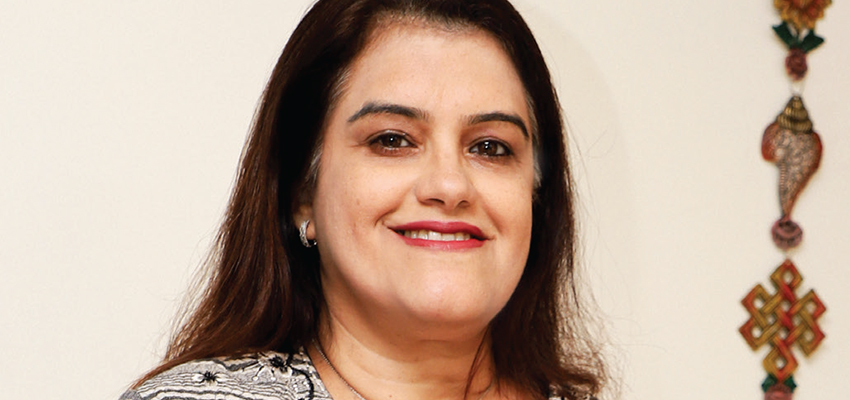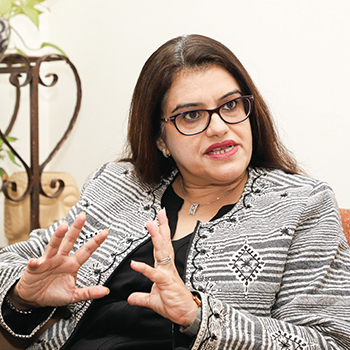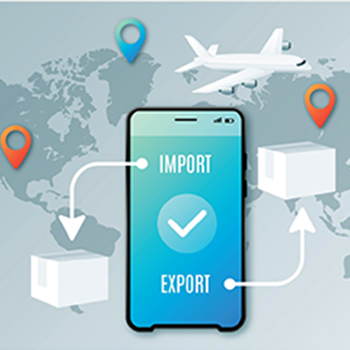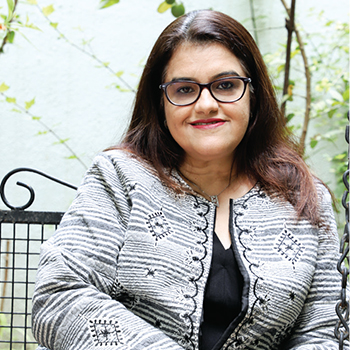Heart over Mind

Vinita Gera is one of the rare corporate bigwigs who wears her heart on her sleeves. Not just in her personal life, but in her professional life as well. “Listen to your heart, it knows everything,” she smiled. This conviction has propelled her remarkably far in her life. Recently, Vinita added another feather to her cap, when she was appointed the president of the Software Exporters' Association of Pune (SEAP). She is currently working as a leadership mentor and independent advisor. Vinita hung her corporate boots last year to see what life has in the offing for her. She enunciates her journey, read on
"Companies that prioritise employee well-being, ethical practices, and community engagement not only attract top talent but also build long-lasting relationships with stakeholders"
-Vinita Gera
Corporate Citizen: Tell us about your early days.
Vinita Gera: I am a complete Puneri Girl, and a proud one too. I am glad to have been born and raised in this fantastic city, where I completed my education. This was largely possible due to my father's decision to prioritise my education over his career advancements. As a government employee, he turned down promotions that would have led to relocations, opting for Pune due to its superior educational opportunities. This choice, though seeming routine back then, now strikes me as a significant sacrifice. Me and my brother, both benefited from this commitment, receiving our entire education in Pune. My engineering college admission also happened to be in Pune, further cementing the stability and continuity of my life in one place.
CC: Tell us about your school and college days, what kind of a student were you?

I've consistently upheld a strong sense of diligence, primarily driven by a fear of underperforming. The apprehension of not meeting expectations loomed large, compelling me to maintain high dedication. While I may not have consistently held the top rank, I typically secured a spot within the top five. My demeanour was characterised by studiousness, sincerity and a subdued nature. I refrained from being overly mischievous, aligning more with the quiet, well-behaved stereotype. This disposition seemed to be the norm for many in my generation, as identity often became intertwined with academic performance.
My inclination towards sincerity extended into college as well. During my final year, I was determined to excel, especially given that it was the inaugural batch of the college. I was fortunate to collaborate on projects with exceptional partners. Being a perpetual learner, I consistently gleaned insights from others and held numerous role models in high regard. Even during my school days, I identified individuals one or two years my senior and aspired to embody their traits. This practice served as a continuous source of motivation for me.
CC: How would you describe yourself professionally?
Professionally, my enduring characteristic has been my humane approach to work. This perspective, more evident in hindsight, entails a straightforward and logical approach devoid of unnecessary complexities. If a decision aligns with what's right and humane, I tend to follow my heart, never engaging in an internal struggle between heart and mind. This has been a consistent aspect of my style, even when most individuals prioritise analytical thinking.
This approach has served me well. For instance, when evaluating potential job opportunities, I place great emphasis on the people I would work with. The vibe and connection I sense during interviews hold immense significance. I've noticed that in several instances, my liking for a company solidified during the interview process itself. While outcomes might vary, this genuine connection remains essential for me, extending to the way I approach hiring decisions.
Looking beyond, the importance of being authentically human has grown more pronounced. Terms like empathy, authenticity, and vulnerability have gained prominence post-Covid, even in corporate environments. While these qualities have always existed, they were rarely highlighted. The corporate sphere once emphasised strength, assertiveness and determination. Today, terms like vulnerability, which were once viewed as weaknesses, have taken on new meaning.
Being human Reflecting on my experiences, I've consistently demonstrated vulnerability, even shedding tears at work. Previously, this might have been frowned upon, but I believe it's essential to normalise such expressions in the workplace. After all, we spend a significant portion of our lives working. Why should emotional moments or authenticity be considered weak? We should be able to laugh and cry without judgment.
I've spoken about this at conferences, advocating for the normalisation of emotional expressions at work. These moments are opportunities for genuine connections. Personally, I've cried in front of bosses and teams without reservations, recognising that it enhances the depth of connection. This authenticity should be seen as a sign of strength rather than weakness. It's time to change the narrative and reshape our understanding of vulnerability and emotion in the professional realm.
CC: Walk us through your first-ever job with DSS Infotech
I joined DSS soon after I graduated in 1995. It was my first job. While I was engaged in the tasks at hand, I hadn't grasped the broader context or seriousness of the professional world. The initial step into the workforce was crucial, acting as the foundation upon which my career was built. Without DSS, I can't imagine how my career might have taken shape. However, I always harboured the knowledge that I wouldn't remain there for an extended period. My aspirations for greater accomplishments and more significant ventures were already taking root. The allure of a new experience, more than the monetary aspect, fuelled
my decision. However, this move marked only the beginning of my journey, as there were more transitions on the horizon.
Consequently, I departed from DSS, and although it may sound somewhat trivial now, my departure was motivated by the promise of an onsite opportunity. At that time, it was a compelling prospect—an invitation to work in France, marking my first venture onto the international stage. Overall, I would say, my time at DSS shaped me into what I am today.
CC: Your career path has been quite scintillating. Where do you think you learnt the most in your career and why?
My most significant learning from my early work experiences actually came from my second job. Unfortunately, I lost that job due to unforeseen circumstances. The project I was working on was abruptly shelved, resulting in the termination of the entire team. This happened just six months into my employment, shortly after the probation period.
At the time, layoffs were uncommon, especially in India's nascent tech landscape, where hiring was far more prevalent than firing. I must have been in my early 20s, and given my young blood, I internalised the situation personally. I believed I had done something wrong and felt a deep sense of failure. This incident hit me hard, akin to failing an exam when I had never failed before. To compound matters, I had significant financial responsibilities, including a home loan that accounted for 70 per cent of my salary. The future felt uncertain, and I grappled with how to manage the next month's EMI payment.
Being prepared
In hindsight, this experience remains a pivotal lesson in my career. It taught me never to take my job for granted and fostered a newfound sense of security and preparedness. I recognised the reality that I could be replaceable, not irreplaceable. The incident, though challenging, armed me with a profound sense of preparedness. While such a scenario never recurred, and I never took my job for granted again, I understood that I was ready to handle it if it did.
Today, with the global economic situation causing workforce reductions and job losses, especially among older professionals, the lessons I learned have grown more relevant. The emotional impact of job loss might be more intense when you're young, but the resilience you develop enables quicker bounce-back. Conversely, in later years, while the emotional impact might be less intense, the process of recovering and finding new opportunities can be more challenging due to various factors like age and responsibilities.
"Managing at the mid-level is a complex and crucial role. As a mid-level manager, you wear three hats – the top hat (managing expectations and deliveries), the bottom hat (leading and nurturing your team), and the side hat (building relationships with peers)"
CC: A corporate advice that changed your life?

At BMC Software, in my post-Veritas journey, my senior’s wise words profoundly impacted my career. While positioned as a director of engineering, his advice defied convention— encouraging replaceability. He stressed the significance of nurturing successors for my role. The wisdom was pragmatic, as it embraced practicality over the abstract. Unlike seeking irreplaceability, the emphasis was on readiness for new challenges. "Always have your successor ready," he suggested. This advice held weight. Instead of pursuing personal indispensability, the focus shifted to ensuring my value was magnified through succession planning. This perspective reshaped my journey. Preparing a successor became synonymous with readiness for greater responsibilities, even promotions. This unconventional advice, initially amusing, was transformative. It unveiled the correlation between security, delegation, and growth. While it questioned traditional notions, it aligned with my sincere ethos, epitomising my secure nature Consequently, as I leveraged newfound time to champion company-wide initiatives, his counsel showcased the symbiosis of replaceability and progress—revealing that making oneself replaceable could indeed fuel an impactful journey.
CC: Can you share an example of a challenging situation you've faced in your career and how you overcame it?
Certainly, one significant challenge I've grappled with is my constant craving for change. It's a trait deeply rooted within me—I'm inherently drawn to change in my roles and responsibilities. While this quality has its merits—driving innovation and adaptability—it can also stir restlessness.
I've traversed through diverse roles, each offering a unique dimension. Initially, I spent considerable time in engineering, followed by a stint in centre management at Dell, overseeing Bengaluru and Pune centres—a horizontal transition. Yet, I found myself venturing back into a vertical, internal IT within Dell. This dynamic trajectory has afforded me a breadth of experiences — engineering, centre management and IT. However, my tendency for change eventually prompted a more significant shift. Despite not having a clear path beyond corporate life, I decided to leave my corporate role. Surprisingly, since that decision, positive opportunities have continued to arise.
Although my penchant for change has its merits, there's a flip side. It can evoke bouts of restlessness and a sense of unfulfillment. People might perceive it as instability, which sometimes raises concerns. Yet, even during my nine-year tenure at BMC Software, the longest stretch in my career, I harnessed this trait constructively. Multiple roles within the company provided the variety I sought, allowing me to contribute meaningfully.
However, I've come to recognise that this disposition might not align with roles requiring consistent problem-solving within the same domain. Such positions demand sustained focus on a specific issue—a pattern that doesn't resonate with my nature. While this attribute has its challenges, it propels me toward opportunities where my inclination for innovation and change can thrive, forging an eclectic path that defies traditional notions of stability.
CC: Your current role is quite different from what you started with.
Indeed, the direction I've taken now stands in stark contrast to my past corporate engagements. This choice was driven by a blend of factors, and while it might seem divergent, it resonates deeply with what I needed at this juncture. I've opted to depart from the confines of traditional corporate roles while concurrently handling a niche aspect—a leadership consultant role, with a degree of autonomy.
This decision was borne out of a desire for greater independence. It offers me the freedom to structure my time as I see fit. If I were to embark on a month-long vacation or indulge in my personal pursuits, I can do so without constraint. The leadership role I undertake allows me to contribute without the weight of traditional corporate responsibilities. This independence aligns with the impulse that guided my heart.
While I hold a deep appreciation for corporate dynamics, this new trajectory feels timely. There was a triggering moment that led me here. Looking forward, I envisaged a trajectory where I'd continue on the same path, eventually retiring after another decade, and performing similar roles. Instead, I opted to grasp the present, to seize the opportunity for freedom and personal pursuits.
CC: So, congratulations, on being the first woman president of SEAP. Tell us about SEAP, and how did it happen to you?
The Software Exports Association of Pune (SEAP), is a well-established organisation that has been shaping the tech landscape of Pune for over 25 years. Founded in 1998 by visionaries such as Anand Deshpande and others, the primary objective of SEAP was to facilitate the establishment of centres in Pune by providing crucial support and guidance for regulatory compliance and other setup-related matters. Over time, SEAP has evolved to mirror the changing dynamics of the tech industry. In today's interconnected world, collaboration and networking have become imperative. SEAP now functions as a network of tech companies with a presence in Pune. This community of members engages in roundtable discussions, webinars and networking events, all aimed at fostering collective growth and addressing common challenges faced by tech companies.
My journey with SEAP began when I was representing Dell as a SEAP member. In 2020, Nitin Deshpande and Prashant KS, longstanding SEAP members, invited me to join the executive committee. Embracing the voluntary nature of the organisation, I started contributing my time, ideas and strategic insights to further SEAP's mission. As part of the executive committee, I collaborated with other members to manage and drive SEAP's initiatives.
SEAP's vision is to foster the growth of tech companies in Pune through shared thought leadership. By pooling resources and insights, companies can collectively address challenges, showcase the Pune ecosystem o stakeholders, and drive growth more effectively. With around 80 to 100 member companies, each playing diverse roles in Pune's tech landscape, SEAP offers a diverse platform for collaboration.
"The challenges faced by mid-level executives vary widely due to their unique circumstances, personalities, and career paths. Some common challenges include navigating organisational politics, dealing with decision-making dilemmas, managing work-life balance, seeking clarity in career goals"
The executive committee, consisting of around 14 seasoned professionals, including myself, guides SEAP's activities. Serving as the president allows me to contribute to the organisation's strategic direction for a two-year tenure. SEAP's journey encapsulates the evolution of Pune's tech ecosystem, where a focus on collaborative growth and collective problem-solving is paramount to success.This diverse community relies on collaborative efforts, reflecting the essence of Pune's tech ecosystem.
Q: Explain to us your role at SEAP and your vision?

As the President of SEAP, I am shaping the organisation's trajectory through my energy and strategic direction. SEAP's president-driven model allows the leader's enthusiasm to influence the collective approach, while the core objective remains consistent. While none of us have full-time roles in SEAP, the effort we invest determines our impact.
We have expanded our membership to include individual leaders, not just organisations. As an individual leader myself, I saw the value in bringing consultants into the fold, and enhancing thought leadership. Collaborating with SEAP's experienced Executive Council members is proving beneficial, leveraging their history and expertise.
Moreover, SEAP is fostering partnerships with organisations like Indo-American Chamber of Commerce, MCCIA among others. My vision includes inclusive participation, particularly involving more women. This change aligns with how SEAP operates—networking and engaging the community. I make it a weekly goal to introduce SEAP to five individuals, encouraging their membership and active engagement
Q: You also counsel mid-level executives. What challenges do they typically face?
The challenges faced by mid-level executives vary widely due to their unique circumstances, personalities and career paths. Some common challenges include navigating organisational politics, dealing with decision-making dilemmas, managing work-life balance, seeking clarity in career goals, honing leadership skills, and addressing communication issues. Many struggle with self- awareness and identifying areas for improvement. As a mentor, my role is to provide guidance, offer solutions, and facilitate introspection to help them overcome these challenges and achieve their professional aspirations. However, the success of these efforts often hinges on the individual's commitment to self-improvement and problem- solving. It's a collaborative journey where both mentor and mentee learn and grow together.
CC: Your advice to them would be?
Managing at the mid-level is a complex and crucial role. As a mid-level manager, you wear three hats – the top hat of managing expectations and deliveries, the bottom hat of leading and nurturing your team, and the side hat of building relationships with peers. Balancing these roles is essential to create a harmonious and effective work environment.
When it comes to the heart-over-mind approach, my advice to corporates and everyone in general is to prioritise empathy, authenticity and vulnerability. In today's world, profit is vital but emotions cannot be ignored. Hence, fostering a humane and understanding work culture is essential. Recognise that emotions drive motivation, creativity and overall job satisfaction. Encourage open communication, embrace vulnerability as a strength, and value each individual's unique contributions. By leading with the heart and understanding the human side of work, we can create workplaces that are not only successful but also compassionate and fulfilling.
CC: Tell us about your inclination towards heart over mind approach?
The concept of "heart over mind" holds significant value, especially in today's corporate landscape. While profit remains essential, it's crucial to recognise that a solely profit-driven approach might not lead to sustainable success. In a world where diverse perspectives and values play a pivotal role, corporations must consider the holistic well-being of their employees, customers and the communities they serve.
Modern leadership embraces a balance between rational thinking and empathetic understanding. A leadership approach that takes into account both profit-driven goals and the emotional needs of individuals creates a more inclusive and forward- thinking environment. This balance recognises that business decisions impact lives and communities beyond just financial metrics.
"In a rapidly evolving world, advice from various sources can be both beneficial and overwhelming. It’s essential to strike a balance between seeking guidance and maintaining personal clarity. For new college entrants, my advice would be to cultivate a clear understanding of their goals and aspirations"

Strategic necessity
Partnering with individuals who bring a different perspective can foster a synergistic approach. For instance, leaders who lean towards heart-driven decision-making can complement their teams with those who excel in analytical and process- oriented thinking. This yin and yang dynamic can enhance problem-solving, innovation, and overall company performance.
Ultimately, the shift towards heart-driven leadership is more than just a trend; it's a strategic necessity. Companies that prioritise employee well-being, ethical practices and community engagement, not only attract top talent but also build long-lasting relationships with stakeholders. In this era of conscious capitalism, the companies that thrive will be those that recognise the importance of embracing both heart and mind in their approach to business.
CC: Now that you have little time on your hand, how do you like to spend it?
I am making the most of this newfound time by engaging in various enriching activities. Learning painting is a wonderful creative outlet that allows me to express myself artistically. I have completed a few paintings, and I am quite happy with my progress.
Prioritising fitness is crucial for maintaining a healthy lifestyle, especially after a period of extensive travel. This has given me the time to focus on my health, it undoubtedly has positive effects on my overall well-being.
I use this time to strengthen my personal connections through non-agenda meetings and spending quality time with friends is an important aspect of maintaining a balanced life. These moments allow for genuine conversations and shared experiences, which contribute to emotional well-being.
Lastly, dedicating time to leisure travel is a fantastic way to explore new places, cultures, and experiences. It allows you to unwind, recharge and gain fresh perspectives. I feel, by embracing these activities, I am nurturing my personal growth and well-being, and enjoying the benefits of a more balanced and fulfilling life.
CC: Your advice to the freshers?
In a rapidly evolving world, advice from various sources can be both beneficial and overwhelming. It's essential to strike a balance between seeking guidance and maintaining personal clarity. For new college entrants, my advice would be to cultivate a clear understanding of their goals and aspirations. When armed with a clear vision, they can make informed decisions and navigate the multitude of advice that comes their way. Knowing what they truly want to achieve empowers them to filter through the noise and confidently shape their path forward.
"I strongly believe that unconscious biases are prevalent in us all. Addressing these biases requires more than a single conversation; it demands a deeper exploration. Therefore, I’m in the process of developing a workshop to uncover unconscious biases."
CC: What’s your philosophy in life?

Live for today, as tomorrow is uncertain. Embracing this philosophy, I'm committed to experiencing all that I desire without delay. While not everything is within my control, I'm dedicated to pursuing my passions and aspirations at the present moment. Setting firm boundaries, I've chosen to engage only in work that resonates with my interests and values. This newfound independence allows me to prioritise my well-being and focus solely on endeavours that bring me joy.
Transitioning from corporate life to independent consultancy has opened doors to numerous opportunities. Despite the suggestions to venture into various directions, I've opted to remain true to my core interest, which is mentoring. However, there's a new endeavour on the horizon that I'm eager to share. I aspire to evolve into an inclusion consultant, concentrating my efforts on promoting diversity and equity. I'm presently engaged in diverse consulting projects, but my future focus lies in the realm of inclusion.
I strongly believe that unconscious biases are prevalent in us all. Addressing these biases requires more than a single conversation; it demands a deeper exploration. Therefore, I'm in the process of developing a workshop to uncover unconscious biases. My goal is to facilitate transformative discussions that lead to meaningful change. Even if a mere two out of ten participants successfully address their biases, I consider it a step forward. Our world is at a crossroads between the past and the present, and catalysing change is imperative.
As we navigate this new landscape, blending the old with the new, I'm dedicated to fostering awareness and change in pursuit of a more inclusive and enlightened society.